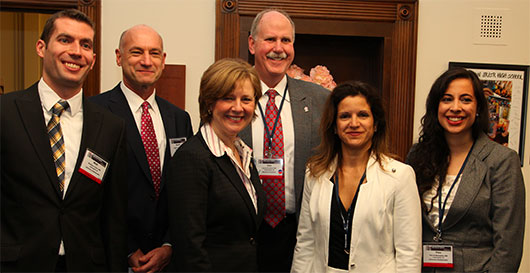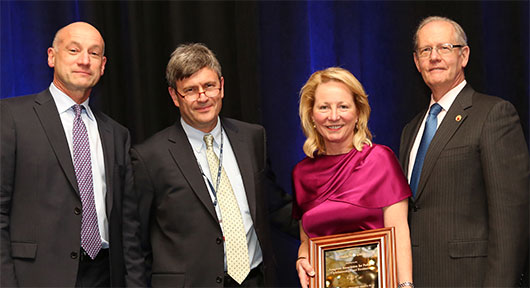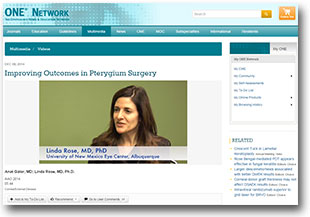Download PDF
WHAT’S HAPPENING
2015 Mid-Year Forum
In mid-April, 424 Academy members gathered in Washington, D.C., to discuss some of ophthalmology’s most critical issues with regulators, legislators, and Academy leaders. EyeNet summarizes three Mid-Year Forum (MYF) sessions below.
Under Pressure: Payment Trends in the Insurance Marketplace. The marketplace for purchasing medical coverage is changing. Not only are record numbers of Medicare beneficiaries choosing private insurers in Medicare Advantage plans, but also an estimated 7 million non-Medicare subscribers are purchasing coverage through Affordable Care Act (ACA) exchanges. These insurer-designed offerings utilize cost control techniques such as narrow networks and quality designation programs. The Academy, Congress, and Centers for Medicare & Medicaid Services (CMS) are voicing concerns about access to both primary and specialty care. Coverage for ophthalmic procedures and surgery may look very different in the next few years.
Ophthalmic Pharmaceuticals: New Challenges to Access. Ophthalmologists and patients have faced unprecedented challenges in accessing several ophthalmic drugs in recent years. New compounding pharmacy laws leave continued access to some critical treatments uncertain, and many generics have seen significant increases in price without explanation. This session examined the continuing impact of compounding pharmacy legislation on ophthalmology practices and discussed the current and future landscape for generic drugs.
New Era in Quality Reporting—Patient Outcomes All the Time. There is broad agreement that current federal quality programs—PQRS, Value-Based Modifier, and meaningful use—are not effective at moving the quality needle. Such programs, which come with the potential for significant financial penalties, often create administrative burden and extra work for physicians, without adding true value or improving patient outcomes. Physicians and patients want the focus to be on what is actually meaningful in terms of patient-centered outcomes. This session explored how specialty-led clinical data registries, such as the Academy’s IRIS Registry, are shaping a new era in quality reporting, shifting focus to clinical outcomes and patient-centered outcomes, and driving true improvements in quality.
To view the MYF Report, visit www.aao.org/myf. For more information on the Advocacy Ambassador Program, email gschmidt@aao.org.
 |
|
2015 CONGRESSIONAL ADVOCACY DAY. Rep. Susan Brooks (R-Ind., center, black jacket) met with Academy members, including (from left to right) Matthew S. Zore, MD, Advocacy Ambassador Program participant from the Indiana University School of Medicine; David A. Plager, MD, Councilor, American Association for Pediatric Ophthalmology and Strabismus; Louis B. Cantor, MD, Senior Secretary for Clinical Education; Yara P. Catoira-Boyle, MD, Leadership Development Program participant nominated by the Indiana Academy of Ophthalmology; and Tina G. Damarjian, MD, Advocacy Ambassador Program participant sponsored by the American Association for Pediatric Ophthalmology and Strabismus.
|
 |
|
ADVOCACY AMBASSADORS AT THE MID-YEAR FORUM. On April 16 at the MYF Awards Banquet in Washington, D.C., the Academy awarded the 2015 Platinum Participation Award to leaders of the American Association for Pediatric Ophthalmology and Strabismus (AAPOS) and the Florida Society of Ophthalmology for their outstanding support of the Advocacy Ambassador Program, which educates residents and fellows about the importance of advocating for their patients and profession. At the presentation ceremony for AAPOS are (from left to right): David A. Plager, MD, AAPOS Councilor; Russell N. Van Gelder, MD, PhD, Academy President; Christie L. Morse, MD, AAPOS Executive Vice President; and David W. Parke II, MD, Academy CEO.
|
TAKE NOTICE
Renew Your Academy Membership for 2015
Last October, the Academy sent your membership renewal packet in the mail. If you have not paid your Academy dues, this will be your last issue of EyeNet until payment is received. You can pay at www.aao.org/member-services by phone at 866-561-8558 (toll-free in the United States) or 415-561-8581, or by fax at 415-561-8575.
Post Your CV & Apply for Jobs
Let hundreds of employers find you by posting your CV to the Ophthalmology Job Center, where hiring practices look to find qualified ophthalmologists and ophthalmic professionals. It is easy to use and free for job seekers.
To get started, visit www.aao.org/ophthalmologyjobcenter.
New Guidelines: Macular Edema Associated With CRVO
The latest Ophthalmic Technology Assessment, Therapies for Macular Edema Associated With Central Retinal Vein Occlusion, reviews the evidence pertaining to the efficacy and safety of therapies for the treatment of macular edema associated with central retinal vein occlusion (CRVO). Therapies used include anti-VEGF pharmacotherapy, intravitreal corticosteroids, laser photocoagulation, radial optic neurotomy, chorioretinal anastomosis, and vitrectomy. Level I evidence indicates that intravitreal anti-VEGF pharmacotherapy is safe and effective over two years for macular edema associated with CRVO, and that delay in treatment is associated with worse visual outcomes. In addition, level I evidence demonstrates short-term efficacy of intravitreal corticosteroid but also an association with a higher frequency of adverse events. The full text is free to Academy members and Ophthalmology subscribers.
To view the Academy’s Ophthalmic Technology Assessments, visit www.aao.org/guidelines-browse?filter=ophthalmictechnologyassessment.
New Clinical Practice Guideline on Postoperative Delirium
The American Geriatrics Society (AGS) recently released a Clinical Practice Guideline for Postoperative Delirium in Older Adults. Funded by the John A. Hartford Foundation in support of the AGS Geriatrics-for-Specialists Initiative, the new guideline offers a framework that will enable hospital systems and health care professionals to implement actionable, evidence-based measures to improve delirium prevention and treatment. Academy members will find this information useful when dealing with patients at risk for postoperative delirium.
To view the free guideline, visit www.geriatricscareonline.org.
 ONE SPOTLIGHT: Check out the latest ophthalmology videos. Many new videos have been added to the ONE Network, now totaling more than 1,400. New videos for practicing ophthalmologists include: ONE SPOTLIGHT: Check out the latest ophthalmology videos. Many new videos have been added to the ONE Network, now totaling more than 1,400. New videos for practicing ophthalmologists include:
- “Glaucoma 360 2015”: Discussions of new therapies and drug delivery methods.
- “ASCRS 2015”: Highlights of the latest in corneal and refractive procedures.
- “AAO 2014”: More than 100 best-of-show and symposia videos, plus discussions about cranial nerve palsy imaging, improving outcomes in pterygium surgery, and more.
Videos geared specifically for residents include:
- Resident lectures: Well-known professors across the United States share their best presentations on uveitis, double vision, imaging of retinal disease, and management of posterior capsule breaks.
- Basic skills videos: More than 70 demonstrations of bleb procedures, retinoscopy techniques, oculoplastic surgeries, tests for ocular motility, and contact lens fitting.
To view, visit www.aao.org/one and click “Multimedia.” Share your own videos by clicking “Submit a Video” in the multimedia menu.
|
ACADEMY STORE
BCSC: Important Updates
The 2015-2016 edition of the Basic and Clinical Science Course (BCSC) is available to preorder starting May 15, and will ship by June 15 (eBooks are available starting June 15). The BCSC is a comprehensive reference for research and clinical experience used by ophthalmologists and residents worldwide. The new edition includes major revisions to:
- Section 1: Update on General Medicine
- Section 7: Orbit, Eyelids, and Lacrimal System (includes six surgical videos)
- Section 9: Intraocular Inflammation and Uveitis (includes four surgical and diagnostic videos)
- Section 12: Retina and Vitreous (includes 10 videos of vitreoretinal procedures)
Choose from print or Academy eBook format. Purchase an individual section, or save when you buy a print and eBook section together or when you purchase a complete set of all 13 sections. The videos are embedded in the eBooks and accessible to print customers for online viewing.
For pricing and more information, visit www.aao.org/bcsc.
Essential Topics: An Intro to Ophthalmic Coding
Are you new to ophthalmic coding, or do you need a refresher on how to code appropriately? Ophthalmic Coding Series: Essential Topics, updated yearly, covers subjects that every coder needs to know: compliance, CPT and ICD-10-CM codes, Evaluation and Management documentation, Eye code documentation, major and minor surgical procedures, modifiers, and testing services. This book is also an excellent study guide for the Ophthalmic Coding Specialist exam.
For more information and to order, visit www.aao.org/store.
D.C. REPORT
Global Bundled Payments for Surgery
The Academy’s efforts prevented CMS from moving forward with a policy to unbundle global surgery payments. The Academy estimates that this policy would have resulted in no less than a 4 percent reduction in ophthalmologists’ surgical related income—a reduction that would have been in addition to the penalties many ophthalmologists may face in the coming years from Medicare quality improvement programs like meaningful use.
CMS’s plan. Last fall, CMS announced plans to eliminate all 10- and 90-day global bundled payments for surgery, beginning in 2017 and 2018, respectively. The agency intended to temporarily break the bundled payments—which cover services normally provided by a surgeon before, during, and after a surgical procedure—to better determine if patients are receiving all of the bundled services accounted for in the payments. This unbundling would have been complex and disruptive, and it likely would have resulted in unfair payments/values for services. CMS expected their initiative to generate savings for the Medicare program as a result of fewer postoperative visits and lower postoperative visit payments.
The Academy steps in. Since the CMS announcement, the Academy worked tirelessly to secure congressional action to prevent CMS from dismantling bundled payments. The medical, surgical, and patient communities quickly mobilized, lobbying for legislation to reverse this policy. Subsequently, Congress included a key provision in the Medicare Access and CHIP Reauthorization Act that preserves the global surgical bundled payments. Instead, CMS will conduct a targeted data collection. This legislation, which also permanently repealed the sustainable growth rate formula and averted a 21 percent across-the-board cut in Medicare physician fees, was signed into law by President Obama on April 16.
MEMBERS AT LARGE
Rep. Phil Roe Addresses LDP
Rep. Phil Roe, MD (R-Tenn.), was the keynote speaker at the April 16 Leadership Development Program (LDP) session, Get Politically Active!, held in conjunction with the Mid-Year Forum in Washington, D.C. Eighteen members of the LDP XVII, class of 2015, had the opportunity to hear Rep. Roe discuss his personal perspectives on being a physician member of the 114th Congress. Rep. Roe said, “We [physicians] have a political power that we’ve never exercised,” and he stressed his goal of building a strong base of physician activists for the House GOP Doctors Caucus, which he cochairs.
Jose Rizal International Medal
At the Asia-Pacific Academy of Ophthalmology’s (APAO) 30th Congress, in Guangzhou, China, on April 2, the APAO awarded Michael W. Brennan, MD, the Jose Rizal International Medal for helping the APAO build a version of the Academy Leadership Development Program. This medal commemorates Dr. Jose Rizal, a national hero of the Philippines. It recognizes exceptional contributions to ophthalmology in the Asia-Pacific region.